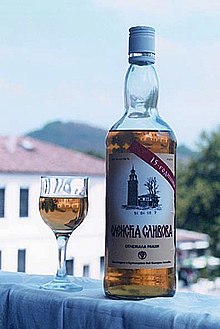Rakija
The rakija (from the Arabicعرق / ʿAraq , via Turkish rakı ), also rakia , is a fruit brandy made by distilling fermented fruits. It is a popular drink in the countries of the Balkan Peninsula , Italy and France . The alcohol content is usually 40%, but homemade rakija can be stronger (50% to 60%). Prepečenica is a double-distilled rakija, the alcohol content of which can exceed 60%. The Turkish rakı , the Bulgarian mastika and the Greek ouzoare distilled again with anise seeds for flavoring . The best known type in Germany is the plum rakija, the slivovitz .
Rakija is considered the national drink of some South Slavic peoples.
Names
Albanian raki / rakia , Aromanian arichii , Bosnian rakija , Bulgarian ракия , Croatian rakija , Greek ρακί / τσίπουρο , Hungarian pálinka , Macedonian ракија , Romanian rachiu / rachie , Serbian ракија rakija , Slovak Pálenka , Slovenian žganje / šnopc , Turkish rakı .
Types of rakija
There are many types of rakija that have different names depending on the fruit they are made from.
The most popular varieties are Sliwowa or Sliwowitz (made from plums) and Grozdowa (also Lozovača) rakija made from grapes . Fruits that are also commonly used for making are peaches , apricots , apples , pears , cherries , figs, and quinces . In Bulgaria and Serbia several types of fruit are used in homemade rakija, in Istria and Dalmatia mainly grapes, which are also known locally as trapa or grappa (similar to the Italian pomace brandy grappa ).
Plum and grape rakija are also mixed with other ingredients such as herbs, honey , sour cherries and walnuts after distillation .
| Most common species | ||
|---|---|---|
| fruit | Designation in ex-Yugoslavia | Name in Bulgaria |
|
Plum (from Sliwa) |
šljivovica, шљивовица, see Sliwowitz |
сливова sliwowa сливовица slivovitsa |
| grapes | lozovača / loza, лозова ракија / лозовача / лоза |
гроздова grozdowa гроздовица grozdowiza мускатова muskatova анасонлийка anasonlijka (with anise ) |
| Grape pomace ( grains ) |
komovica, комова ракија / комовица |
джиброва Djibrowa джибровица Djibrovitsa шльокавица zlyokavitsa |
| apricot | kajsijevača, кајсијевача | кайсиева kajsiewa |
| peach | rakija od breskve / ракија од брескве | праскова praskowa |
| pear | kruškovača / vilijamovka, крушковача / виљамовка, крушка | крушова kruschowa |
| Apple | jabukovača, јабуковача | ябълкова yabalkova |
| Mulberries | dudova rakija / dudovača / dudara, дудова ракија / дудовача / дудара |
черничева Tschernicheva |
| quince | dunjevača, дуњевача | дюлева djuleva |
| Cowardly | smokvovača, смоквача | smokinova smokinova |
| cherry | višnjevača | черешова chereschowa |
| several fruits | - | плодова plodowa |
In Albania, raki is usually understood to mean the grape brandy raki rrushi with an alcohol content of 70 to 80 percent by volume. The mulberry brandy raki mani is also valued .
Rituals and rakija
Although wine makes up an essential part of the Eucharist rite in the Orthodox and Catholic churches of the region, rakija is also used in some religious rituals in the Balkan Peninsula. At the end of an Orthodox Christian funeral, visitors are offered a piece of bread ( pogača ) and a glass of rakija. One drinks a little, after which one drips a few drops on the floor "for the soul of the deceased" with the words "God should take care of her / him" (e.g. in Romanian Dumnezeu să-i primească ) before the Rest drinks.
At weddings, the groom's father goes around all the tables and offers the guests a glass of rakija - they drink a toast to the happiness of the bride and groom. In general, guests in southeastern Europe are greeted with a glass of rakija when they visit their homes. In addition, the rakija is usually served as an aperitif , i.e. before eating, with a salad.
Web links
Individual evidence
- ^ Martin Votruba: Slivovica / Slivovitz . In: Slovak Studies Program . University of Pittsburgh. Retrieved May 12, 2010.

